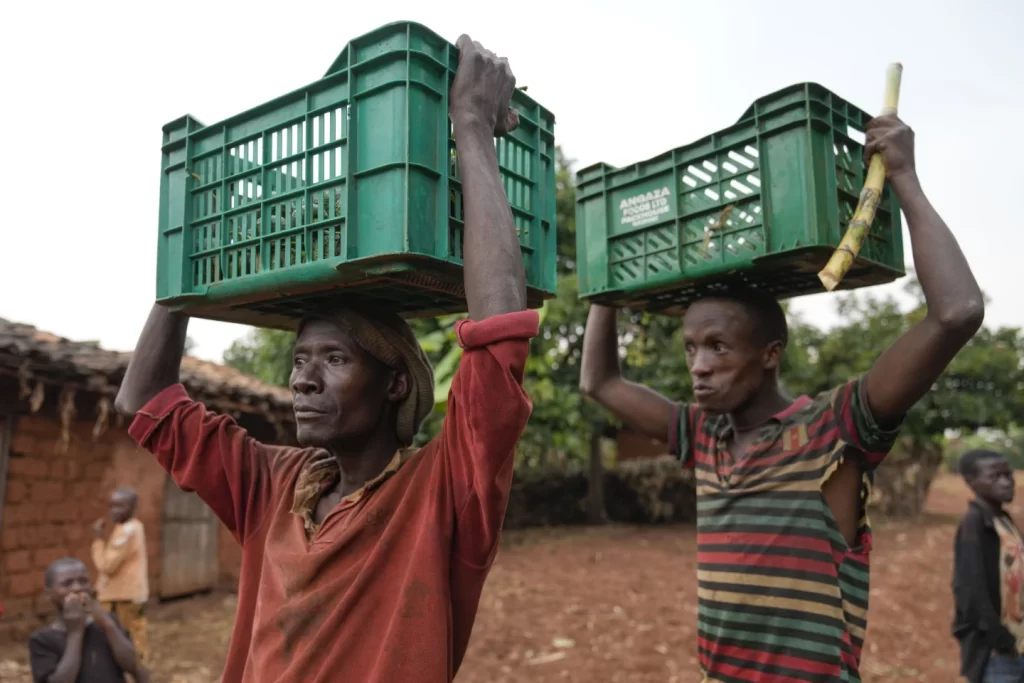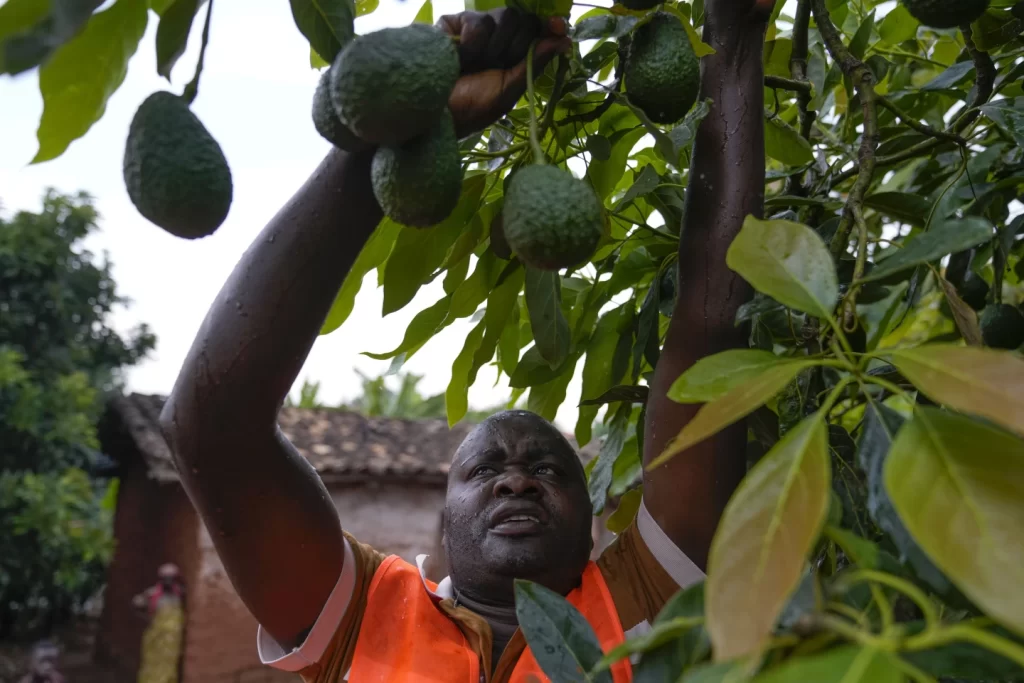In the remote region of Kayanza, Burundi, an agricultural revolution is subtly unfolding, capturing the attention of local farmers and foreign markets alike.
While many consider Burundi to be among the poorest nations in the world, the burgeoning avocado trade signifies a potential escape from this classification for its smallholder farmers.
Through a series of strategic governmental and cooperative interventions, avocado growers are witnessing transformative changes in their income and market accessibility, leading to enhanced livelihoods and economic empowerment.
Historically, farmers in Burundi relied heavily on subsistence farming, primarily growing crops for their families’ sustenance. Until recently, when farmers sought to sell their avocados, they often gathered by the roadside, forming crowds around truck-based buyers.
This informal system, while operational, offered meager returns. For instance, just a year ago, smallholder farmers received a mere 10 cents per kilogram of avocados—a price that barely compensated for the labor and resources invested in production. Such income was insufficient compared to even the most basic commodities, such as a small bottle of water.
However, as the international demand for avocados has surged, prompted by the fruit’s nutritional benefits and versatility, the landscape of this trade has undergone significant revitalization.
Farmers are now receiving payments that have jumped to approximately 70 cents per kilogram, a sevenfold increase in the selling price within a year.
This remarkable shift reflects not only changes in market dynamics but also the critical role of organized cooperatives and government initiatives in stabilizing and enhancing conditions for farmers.
The establishment of cooperatives, such as Green Gold Burundi, has emerged as a pivotal mechanism in ensuring fair trade practices. Green Gold Burundi, representing around 200,000 farmers across the country, plays a crucial role in bridging the gap between individual growers and foreign markets.
Acting as intermediaries, these cooperatives are positioned to combat the exploitation that may arise from direct dealings between farmers and foreign traders.
By pooling resources and negotiating collectively, cooperatives can secure better terms for their members, effectively dismantling the exploitative practices that have historically plagued the industry.
The cooperative model, particularly in the case of Green Gold Burundi, facilitates not only transparency but also fosters trust between farmers and exporters.
Payments made in U.S. dollars are directed into the bank accounts of the cooperatives, which expedite payments to their members soon after the avocado haulers depart.
This process ensures that farmers receive their earnings promptly, providing them with much-needed liquidity to reinvest in their farms or support their households.
The Burundian government has also recognized the potential of avocado farming as a significant contributor to the economy.
Farmers’ cooperatives have been supported through various regulations aimed at structuring the avocado trade. One of the most crucial moves has been the push towards registering foreign avocado dealers, ensuring that all transactions are duly accounted for within the local economy.
This not only protects local farmers but also enhances the credibility of the avocado trade on international platforms.
Ferdinand Habimana, vice president of Green Gold Burundi’s administrative board, highlights the government’s objective to trademark avocados originating from Burundi.
The intent is to establish a unique identity for Burundian avocados in international markets, which would bolster their appeal and potentially increase prices for farmers.
Currently, the significant price differences between local and international market rates underscore the need for a more robust trade framework. While farmers receive approximately 70 cents per kilogram domestically, exporters can fetch between $3 and $5 for the same quantity abroad.
Despite these advancements, several challenges remain in fully realizing the potential of the avocado industry in Burundi.
Farmers and agricultural representatives often argue that the current prices, although improved, are still inadequate relative to international market standards. The gap between what farmers earn and what global markets pay illustrates the need for further regulatory measures.
To fully harness the economic potential of avocado cultivation, there is a pressing need for the Burundian government to implement more stringent regulations, such as establishing minimum price guarantees for farmers and controlling the flow of foreign agents that directly approach individual growers.
Promoting the cultivation of varieties like Hass—favored in European markets—could enable Burundi to tap into lucrative export opportunities while diversifying its agricultural output beyond traditional crops such as coffee and tea.
Government officials, including Onesime Niyukuri from the Ministry of Foreign Affairs, have articulated the necessity for bolstering the avocado export framework, particularly in light of current economic circumstances.
The call for establishing a new paradigm for trade is not only a response to immediate fiscal challenges, such as dollar shortages affecting the import sector, but also a strategic vision for economic diversification. As stated, “Burundi cannot rely only on coffee and tea.”
The evolving avocado trade in Kayanza, Burundi, presents a compelling narrative of hope and resilience amid challenging socio-economic conditions.
Through concerted efforts by farmers’ cooperatives and governmental bodies, smallholder avocado farmers are beginning to experience an economic uplift that can significantly alter their quality of life.
With continuous support for regulatory frameworks and market access, Burundi stands on the precipice of transforming its agricultural exports.
Burundi, a modest yet remarkable nation nestled in East Africa and approximately the size of Maryland, is home to a burgeoning population of around 13 million inhabitants who face significant economic challenges.
In 2023, the country’s annual income per capita registered at a mere $199, categorizing it among the lowest in the world, with a staggering 65% of its citizens living below the poverty line, as reported by the World Bank.
The backbone of Burundi’s economy is agriculture, with a predominance of rural livelihoods in provinces such as Kayanza, where many families rely on subsistence farming, cultivating potatoes and vegetables primarily for their annual consumption.
However, a notable exception has emerged in the form of avocado cultivation, which has surprisingly transformed the economic dynamics for certain growers.
Take Eric Nsabimana, for instance; he embarked on his journey as an avocado farmer responding to a governmental push initiated during former President Nkurunziza’s tenure.
While some farmers initially resisted this shift, uprooting seedlings provided by the government, they now reflect on their decision with regret, as those who embraced avocado farming are witnessing profound economic returns.

Nsabimana himself projects an impressive annual income exceeding $6,000 from his avocado endeavors, which has enabled him to expand his landholdings to include five additional hectares planted with 500 avocado trees.
In a concerted effort to improve the livelihoods of local farmers, the cooperative Green Gold Burundi has taken significant steps to mobilize avocado farmers and secure fair compensation for their produce in the wake of exploitation by foreign traders.
An enlightening incident occurred earlier this year when Habimana, a senior official with the cooperative, tracked a truck transporting avocados to Tanzania, only to discover that the ultimate destination was a more lucrative export market elsewhere, not intended for the local populace.
This revelation prompted Green Gold Burundi to prioritize the registration of avocado farmers, thereby cutting out intermediaries and ensuring that farmers receive equitable prices for their harvests.
The cooperative is also dedicated to reinvesting a portion of its profits into operational sustainability, which includes providing members with high-quality seedlings and organic manure.
Munezero, the cooperative’s quality management official, acknowledges the ongoing issues related to avocado pricing, yet emphasizes their focus on capacity building and encouraging local farmers to plant more avocado trees, thus promoting a sustainable agricultural model.
Over the past year, Green Gold Burundi has successfully distributed millions of avocado seedlings, tapping into the enthusiasm of farmers eager to join this lucrative crop movement; even those with a few backyard Hass trees are beginning to regard avocados as a promising cash crop.
As articulated by Samuel Niyinyibutsa, a local grower, avocados symbolize a significant financial opportunity—“Avocados mean dollars to us.”
Despite the contrasting experiences of some community members who witness the burgeoning financial success of their peers, there remains a prevailing belief that others can still seize this opportunity.
“They still have time,” Niyinyibutsa affirms, advocating for broader awareness and engagement in avocado cultivation, which has the potential to lift many from the clutches of poverty and enhance the overall economic landscape of Burundi.
As the world increasingly values sustainable and locally produced agricultural products, the journey of avocados in Burundi could serve as a blueprint for other sectors seeking similar paths to empowerment and economic security.
By ensuring that rewards from agricultural products are equitably distributed, Burundi may tread the path toward sustainable development—one avocado at a time.
